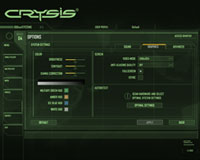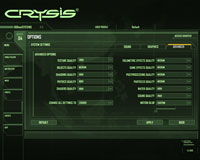Crysis
Publisher: Electronic ArtsWhat can we say about this game that hasn’t been said already? Crysis is probably the most anticipated game on the PC last year and was released on November 16th 2007.
Crysis is seen by many as the poster boy for DirectX 10 and it will make your system cry, quite literally – it’s a monster! It doesn’t come as much of a surprise then, that the graphics are something special – they’re above and beyond anything we’ve ever seen in a PC game.
We tested the game using the 64-bit executable under both DirectX 9.0 and DirectX 10 with the 1.2 patch applied. We used a custom timedemo recorded on the Harbor map which is more representative of gameplay than the built-in benchmark that renders things much faster than you're going to experience in game. We found that around 30-33 fps in our timedemo was sufficient enough to obtain a playable frame rate through the game. It's a little different to other games in that the low frame rates still appear to be quite smooth.
For our testing, we set Texture Detail, Shadows Quality, Physics Quality, Shaders Quality and Water Quality to High, while all other settings were set to medium. Because of how intense the game is, we tested with both anti-aliasing and anisotropic filtering disabled at resolutions above 1280x1024 for the time being. There is currently no support for anisotropic filtering in the game, but you can still force it from the driver control panel.
DirectX 9.0
DirectX 10
Things start off well for the GeForce 9800 GX2, as it delivers higher frame rates than all of the other configurations tested—both under DirectX 9.0 and DirectX 10. What's more, you'll get playable frame rates at resolutions up to 1920x1200 at the settings we've tested with here – you can't say the same for the card the 9800 GX2 is replacing, the GeForce 8800 Ultra, and even the Radeon HD 3870 X2 suffers from some stuttering problems at some resolutions in DirectX 10 mode.
We tested this out by playing through certain parts of Crysis that we've found to be stressful on all hardware and it confirmed what we're seeing in our test scenario – Crysis occasionally stutters on the Radeon HD 3870 X2 at both 1280x1024 2xAA 0xAF and 1920x1200 0xAA 0xAF. We didn't encounter the stuttering problems at 1680x1050 0xAA 0xAF, though and the gaming experience was good.
The GeForce 9800 GX2 delivered smooth frame rates all the way through some of the most intensive parts of the game at 1680x1050 with all but motion blur turned up to high. We'll have to wait a while until we can get to play Crysis smoothly with everything turned up to 'Very High', but the GeForce 9800 GX2 is still further forward than we've been before with a card that plugs into a single PCI-Express slot.
What's interesting is the fact that the GeForce 9800 GX2 is slightly faster than a pair of GeForce 8800 GTS 512MB cards right across the board—even despite the 50MHz core and 125MHz shader clock speed deficits. We knew that the GeForce 8800 GTS 512MB was memory bandwidth limited, but a 30MHz increase in memory speed shouldn't be all that it takes to alleviate that problem. We're not alone seeing this though, so it looks like the BR04-300 chip is working its magic in one way or another.

MSI MPG Velox 100R Chassis Review
October 14 2021 | 15:04











Want to comment? Please log in.